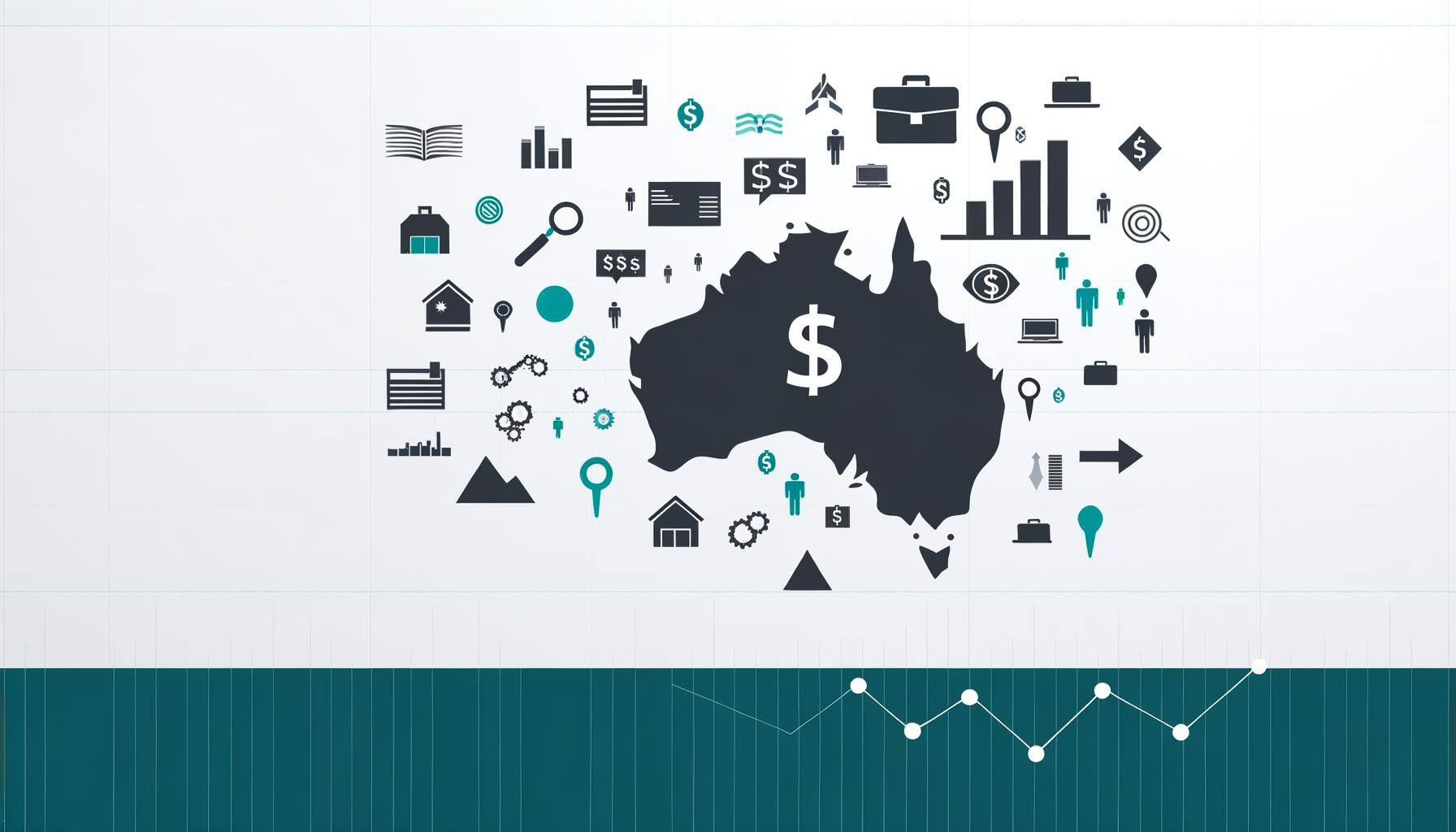RBA's Inflation Woes: Australia Faces Potential Rate Hikes
As of 28 June 2024, the Reserve Bank of Australia (RBA) finds itself in a precarious position, grappling with a persistent inflation crisis that shows no signs of abating.
Australia's Unique Inflation Challenge
Unlike its global counterparts, Australia is experiencing a worrying trend in inflation rates. Phil O'Donoghue, chief economist at Deutsche Bank, notes:
"Australia is the only G10 country where underlying inflation has increased since December."
The RBA's preferred measure, trimmed mean inflation, rose to 4.4% over the year to May, a 0.4 percentage point increase since December. This contrasts sharply with other G10 countries, which have seen an average decline of 0.9 percentage points.
Potential Rate Hikes on the Horizon
Economists are now predicting multiple rate rises as the RBA may be forced to inch towards a 5% cash rate. This comes as the central bank has failed to match its global peers, who have raised rates to 5.0-5.5%.
The May inflation data paints a concerning picture:
- Headline inflation: 4.1% over the past year
- Trimmed mean inflation: 4.4% over 12 months to May
- Services inflation: 5.1% on a six-month annualised basis
Government Spending Fuelling Inflation
Adding fuel to the fire, government spending remains high. Deutsche Bank estimates that federal and state government deficits combined will reach 3.6% of GDP in 2024-25, up from 2.1% in 2023-24.
Implications for Investors
Higher rates are likely to impact cyclically sensitive sectors of the economy. Investors should be cautious of illiquid portfolios and consider seeking safety in liquid securities with credible valuations.
As Australia navigates these challenging economic waters, all eyes will be on the RBA's next move following the release of the June quarter inflation data in July.
ANZ's $4.9 Billion Suncorp Bank Acquisition Gets Green Light
Treasurer Approves Deal with Additional Conditions
In a significant move for Australia's banking sector, Treasurer Jim Chalmers has approved ANZ's $4.9 billion acquisition of Suncorp's banking business. The decision, announced on 28 June 2024, comes nearly two years after the deal was first proposed and includes several new conditions.
ANZ CEO Shayne Elliott welcomed the approval, stating it would help ANZ compete more effectively with larger rivals Commonwealth Bank and Westpac. This marks the largest banking merger since CBA's acquisition of Bankwest in 2008.
Key Conditions of the Approval
- No regional branch closures nationwide for three years
- No net job losses for three years due to the acquisition
- ANZ encouraged to join Australia Post's Bank@Post service
These conditions are in addition to those already imposed by Queensland, where Suncorp is based.
"This is an on-balance call, but I think it is the right one because it recognises all of the issues at play here, and imposes some pretty strict, enforceable conditions at the same time," Dr Chalmers told reporters.
Impact on the Banking Sector
The approval acknowledges the changing landscape of Australia's banking sector, including increased competition from digital banking and the need for scale to drive investment. It also recognises Suncorp's desire to focus on its insurance business amidst industry challenges.
ANZ expects the acquisition to boost its retail and commercial businesses, enhancing its competitiveness in the Australian market. The deal is set to be completed by 31 July 2024, with Suncorp planning to return the majority of net proceeds to shareholders in early 2025.
Adore Beauty Acquires Ikou for $25 Million in Strategic Move
In a bold move to boost its private label business, Adore Beauty has purchased wellness and skincare brand Ikou for $25 million. The acquisition, announced on 28 June 2024, is set to strengthen Adore's position in the Australian beauty market.
Strategic Fit and Expansion
Adore Beauty's outgoing CEO, Tamalin Morton, highlighted the strategic importance of the acquisition:
"Ikou complements and strengthens our existing business, delivering revenue growth and margin expansion, as well as supporting private label and physical store initiatives."
Ikou, founded 17 years ago in the Blue Mountains by Naomi and Paul Whitfeld, brings a range of organic skincare, bath and body products, home fragrances, and herbal teas to Adore's portfolio. The brand's three NSW stores also provide Adore with its first brick-and-mortar presence.
Financial Details and Market Response
The deal involves an upfront payment of $20 million, with the remaining $5 million due in 18 months. Ikou reported sales of $8.1 million and earnings of $2 million this year. Despite the positive news, Adore Beauty's shares dipped 2.7% to 92¢ following the announcement.
Challenges and Future Outlook
Adore Beauty has faced challenges since its IPO three years ago, with its market capitalisation falling due to higher costs and lower margins. The company is actively seeking a new CEO as Morton prepares to step down later this year.
While economic conditions remain challenging, Adore Beauty is targeting earnings margins between 2% and 4%. The Ikou acquisition is expected to play a crucial role in achieving these goals and strengthening Adore's position in the competitive Australian beauty market.
Mirvac Sells Major Stake in Sydney Skyscraper, Confirms Earnings Outlook
In a significant move, Mirvac has offloaded a two-thirds stake in its planned $2 billion Sydney office tower to Mitsui. The ASX-listed property group also reaffirmed its full-year earnings guidance, projecting operating earnings per stapled security of 14¢ to 14.3¢ and distribution per stapled security of 10.5¢.
Key Developments:
- Mirvac and Mitsui will share leasing risk for the 55-storey harbour-view tower
- MinterEllison secured as the latest law firm tenant
- Mirvac to handle development, construction, and management
This transaction aligns with Mirvac's strategy to divest lower-quality office assets and focus on premium properties. The company also confirmed the sale of its Melbourne office tower at 367 Collins Street, with settlement expected in July 2024.
"We're streamlining our portfolio to concentrate on high-quality, future-focused assets," a Mirvac spokesperson stated.
In other news, Mirvac is set to sell its North Sydney office tower at 40 Miller Street to US investment manager Barings for approximately $145 million, representing a significant discount from its peak book value.
Residential and Industrial Updates
Mirvac anticipates about 2400 residential lot settlements for the financial year, slightly lower than previous estimates. The company has also completed the sale of its Aspect South Industrial precinct in Sydney to the Mirvac Industrial Venture, with Australian Retirement Trust acquiring a 49% stake.
Mirvac is scheduled to release its full-year earnings on August 8, providing investors with a comprehensive view of its performance and strategic direction.
Australian Shares Set to Rise Following US Gains
Australian shares are poised for a modest uptick on 28 June 2024, mirroring gains in New York. The ASX futures were up 26 points or 0.3% to 7775 near 7am AEST.
Market Highlights
In the US, the S&P 500 and Dow both closed 0.1% higher, while the Nasdaq Composite rose 0.3%. Gold and oil prices also saw increases. The Australian dollar held steady at 66.49 US cents.
US government bond yields fell as new data suggested slowing economic growth, bolstering hopes for interest rate cuts later this year. Some economists are predicting up to 125 basis points of cuts by year-end.
Expert Opinions
"The consensus soft-landing narrative is wrong. The US will fall into a recession in late 2024 or early 2025," warns Peter Berezin from BCA Research.
However, Michael Brown from Pepperstone sees no reason for concern, expecting markets to continue their upward trend.
Stocks to Watch
One of Australia's largest cryptocurrency exchanges reported a 75% profit slide in the last financial year. Meanwhile, banks are increasingly critical of lending rules, arguing they restrict home loan access to all but the wealthy.
Looking Ahead
Investors are eagerly awaiting Friday's personal income, spending and price-related data from the US. These figures could provide crucial insights into the direction of inflation and potential future interest rate decisions.
Locally, private sector credit data for May will be released at 11.30am AEST, offering a glimpse into Australian economic health.
Fujitsu's Australian Data Centres Up for Auction
In a move set to shake up the Australian data centre market, Japanese tech giant Fujitsu has enlisted Sayers Advisory to auction off its six data centres across the country. This presents a unique opportunity for investors looking to enter the booming data centre sector without the hefty price tag of larger operations like AirTrunk.
Key Details of the Auction
Dubbed 'Project Emerald', the sale includes facilities in NSW, Victoria, Queensland, and WA. These strategically located centres boast:
- Total capacity of 24.7 megawatts (MW)
- 7.9 MW sold capacity
- Over 100 MW expansion potential
- 130+ existing blue-chip customers
Market Context and Valuation
Data centres are hot property in Australia, typically fetching 20-25 times EBITDA. Factors influencing valuation include capacity, quality, location, and client base. For comparison, a recent sale of Etix Everywhere's stake valued the company at $350 million for 17.3 MW capacity.
"Smaller-scale data centres have been hot property in recent years," industry experts note.
Investment Opportunity
This auction offers a rare chance to invest in well-positioned, smaller-scale data centres with significant growth potential. With the global shift towards digital infrastructure, Fujitsu's Australian data centres represent a compelling opportunity for savvy investors looking to capitalise on the ongoing data boom.
Australian Household Wealth Soars to $16.2 Trillion
Australian households are experiencing a significant boost in wealth, with total household wealth reaching $16.2 trillion in the March quarter of 2024. This represents a substantial increase of $1.5 trillion compared to the previous year, according to data from the Australian Bureau of Statistics (ABS).
Property and Shares Drive Wealth Growth
The surge in household wealth can be attributed to rising property values and strong performance in the share market. Residential land and dwellings were the largest contributors, adding 1.3 percentage points to the quarterly growth.
"Rising asset values continued to drive growth in household wealth in the first quarter of 2024, with house prices continuing to increase," said Mish Tan, ABS head of finance statistics.
Wealth Effect and Spending Patterns
Economists suggest that this increase in wealth may be influencing consumer behaviour, particularly among older Australians who own their homes outright. ANZ economist Madeline Dunk noted that consumer confidence is higher among homeowners, and those over 55 are tending to spend more on discretionary items like travel and indulgences.
Impact on Monetary Policy
The continued growth in household wealth, driven by property values, may be affecting the effectiveness of monetary policy. Independent economist Saul Eslake argues that higher interest rates are not having the expected impact on wealth contraction, potentially due to Australia's strong focus on property investment.
Superannuation and Shares Contribute to Wealth
In addition to property, superannuation assets and direct ownership of shares also contributed significantly to the growth in household wealth. Superannuation assets added 0.9 percentage points, while direct share ownership contributed 0.4 percentage points to the quarterly growth.
As Australian household wealth continues to grow, it remains to be seen how this will impact consumer behaviour and economic policy in the coming months.
$5 Billion Desalination Plant Planned for WA's Pilbara Region
In a groundbreaking partnership, Ngarluma traditional owners, French energy giant SUEZ, and water infrastructure developer Legacie are joining forces to construct Western Australia's largest desalination plant. The $5 billion facility, set to be built at Balla Balla River in the remote Pilbara region, aims to provide 150 gigalitres of desalinated seawater annually to nearby industries.
Key Points:
- Construction could begin as early as 2026
- The plant will be 50% larger than Perth's desalination facilities
- Ngarluma Aboriginal Corporation will have equity and a voice at the table
Legacie's managing director, Daniel Lambert, emphasised the importance of the project, stating:
"The Pilbara is an incredibly thirsty region. Water is absolutely critical to supply resources, upcoming projects around hydrogen and green steel manufacturing, growing communities, and the agricultural industry."
The Balla Balla site, located about 1,600 kilometres north of Perth, was chosen for its ideal positioning, with access to seawater and proximity to key industrial areas. The project is expected to produce its first water in early 2029, pending final approval from the Ngarluma community.
This initiative represents a significant step towards sustainable water management in the resource-rich Pilbara region, addressing growing industrial and community needs while protecting valuable groundwater resources.
Bourke Abattoir Boosts NSW Goat Industry and Local Economy
The reopening of the Bourke abattoir has led to a massive surge in goat slaughter rates in NSW, breathing new life into the outback town. Since Thomas Foods International (TFI) purchased the facility in 2021, goat processing has increased by nearly 5,000 per cent, with the plant now handling 3,500 head per day.
Economic Impact on Bourke
The abattoir's success has created 200 new jobs, boosting Bourke's population and economy. Local businesses, like Morrall's Bakery, are thriving due to increased trade and catering opportunities.
"It's good for us and it's good for the whole town," said Tanya Milgate, owner of Morrall's Bakery.
Future Growth and Investment
TFI has announced a $50 million expansion plan to increase the facility's capacity to 6,000 head per day. This investment will enhance freezing, cold storage, and distribution capabilities, solidifying Bourke's position in the growing goat meat export market.
Industry Outlook
Despite challenges in staffing, the abattoir's success signals a bright future for Australia's goat industry. NSW is now the third-largest goat processing state, with slaughter rates up 44 per cent in the past quarter alone.
As global demand for goat meat continues to rise, Bourke's revitalised abattoir is well-positioned to capitalise on this growing market, bringing economic benefits to the region and strengthening Australia's position in the global goat meat trade.


